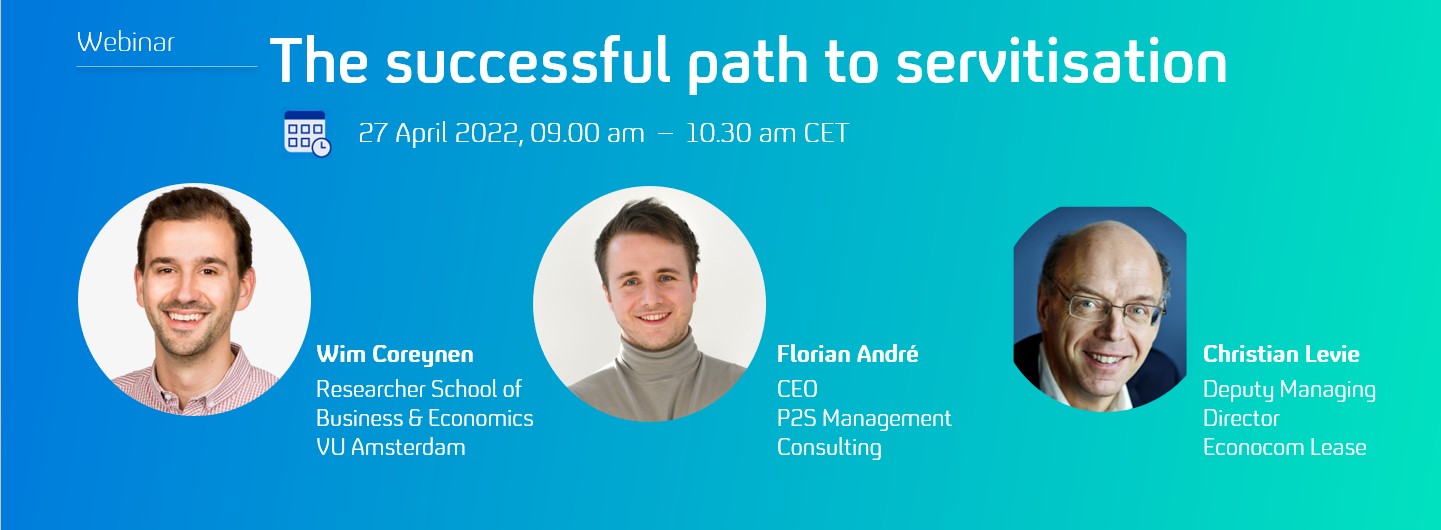First EaaS Capacity Building Webinar BE
The successful path to servitisation
Market Trends
In recent years, the way people and companies consume has changed towards more functionality, experience and results, towards more flexibility and simplicity. A switch from a linear economy characterized by ownership and obsolescence to a circular economy supporting usage and life cycle extension is also operating with an increased focus on the Total Costs of Ownership and Life cycle costs. As a result all industry segments are being disrupted by service oriented business models. Such business models operate a shift from low value creation of selling a product that becomes a commodity over time to a high value creation of delivering a result and improving the value proposition brought to the customer by tackling his pains. The supplier becomes the strategic, financial and operational partner of the customer.
“As-a-service business models will be a key enabler to overcome many of the challenges and complexities of todays’ world, from the increased competition and evolving customer needs to the complex geopolitical situation and the need to transition to climate neutral economy.” Christian Levie – Econocom Lease BeLux
Servitisation challenges
Servitisation is the transformational journey a company goes through to go when transitioning its business model from selling a product to selling a solution over time. With results oriented business models, most of the obligations and responsibilities fall in the hand of the supplier, who bares the responsibility of the equipment financing, performance, servicing, and life cycle management.
The biggest obstacle or most challenging factor is culture: people within the company will have to change their mindset from selling a product to selling a solution.
When researching on the barriers to scaling up Service oriented business models, Dr. Wim Coreynen identified the following 3 types of organisational barriers:
- Service Design barrier where companies are focused on improving the product and face the challenge of how to develop new services.
- Roll out barrier where companies have developed new services and face the challenge of rolling out and exploiting the services created, expanding the market and making operations more efficient.
- Logic/organisational barrier where companies face the challenge of developing a structure that is supportive of new services and adapting the organisation’s culture.
Key Success factors
Speakers Christian Levie (Econocom Lease), Florian André (P2S Management Consulting) and Wim Coreynen (VU Amsterdam) shared a few key sucess factors for implementing and scaling up service oriented business models:
- Customer centricity : create services by starting from your customer’s needs.
- Focus on the service to be delivered: allow attention, time and resource to experiment and develop on new services rather than focusing entirely on technological and product innovation. Think about service from the beginning and not as an add on to the product.
- Cooperate and co-create: be it to develop the required digital monitoring capabilities, to manage the risks, to guarantee a high level of service or to alleviate financial constraints, building partnerships is key to the implementation and scaling up of as-a-Service solutions.
- Train the sales and delivery personnel: there are significant differences between service sales and products sales. Ensure that your personnel receives the appropriate training and preparation to perform in a service based environment.
- Develop scalable services and solutions: the delivery of services need to be operated in an efficient manner to ensure the associated costs remain under control.
- Share the residual value of the equipment with your first customer: sharing part of the residual value of the equipment with your customer will make the as-a-service proposal more attractive to the customer.
“Few companies are able to deliver an Equipment-as-a-Service solution entirely by themselves. In practice, many EaaS solutions imply co-creation and cooperation between supplier and partner to e.g. keep the ownership out of the BS of the supplier on a temporary basis , to guarantee level of services, offer technical solutions on the digital side.” Christian Levie, Econocom Lease BeLux.
Getting started and going
- Assess your readiness to servitise and dicuss with your colleagues.
- Explore and understand your customer and reflect on how to bring peace of mind to your customer and on what is needed to deliver the new value proposition.
- Define a concrete as-a-service offering in cooperation with your customer and other partners.
- Design the internal organization as new roles will need to emerge.
- Launch and grow by testing the model, structuring the data analytics, defining customer expansion strategy.
Webinar recording
The recording of the webinar is available on the EaaS Youtube channel.
Speakers
- Wim Coreynen, postdoctoral researcher at the School of Business and Economics of the Vrije Universiteit (VU) Amsterdam. His research interests include strategy, innovation management, and entrepreneurship, specifically related to servitization, digitalization, and sustainability
- Florian André, Founder and CEO at P2S Management Consultant an innovation consultancy specialised in helping manufacturers develop industrial subscription business models.
- Christian Levie, Deputy Managing Director of Econocom Lease at Econocom BeLux. Econocom acts as a financing partner and supports companies and governments in the implementation of as-a-service business models, product-service combinations, leasing solutions.

